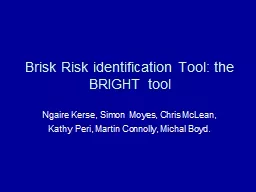PPT-Bright Kids Who Can’t Keep Up
Author : trish-goza | Published Date : 2019-12-02
Bright Kids Who Cant Keep Up Ellen B Braaten PhD Associate Professor Harvard Medical School CoDirector The Clay Center for Young Healthy Minds Director Learning
Presentation Embed Code
Download Presentation
Download Presentation The PPT/PDF document "Bright Kids Who Can’t Keep Up" is the property of its rightful owner. Permission is granted to download and print the materials on this website for personal, non-commercial use only, and to display it on your personal computer provided you do not modify the materials and that you retain all copyright notices contained in the materials. By downloading content from our website, you accept the terms of this agreement.
Bright Kids Who Can’t Keep Up: Transcript
Download Rules Of Document
"Bright Kids Who Can’t Keep Up"The content belongs to its owner. You may download and print it for personal use, without modification, and keep all copyright notices. By downloading, you agree to these terms.
Related Documents














